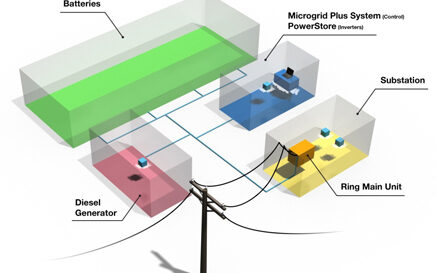Australia’s first portable 1MW/1MWh lithium-ion battery storage facility has been a success during the initial stage of a trial to determine if it can smooth peak demand periods.
The Grid Energy Storage System (GESS) automatically provides support into the 22kV grid in Melbourne, Victoria during busy periods and recharging during low demand periods during the two-year trial.
Victorian network operator SP Ausnet commissioned GESS in partnership with automation engineering company ABB Australia and battery manufacturer Samsung SDI.
After the first summer of the trial Ausnet are pleased with the performance of the battery system, both operationally and from the ability to successfully supply electricity into the grid when required, said a spokesman.
The trial is part of a comprehensive demand management program, aimed at using innovations and initiatives to smooth peak demand periods, which can delay or offset the need for expensive investment in the network.
The system, which includes a 1MW diesel generator as a secondary supply, aims to improve the quality of power delivery, and provide active and reactive power support when connected to the network.
The project, which launched on December 1, 2014, also World-renowned battery researcher, Professor Michel Armand was among researchers from Deakin’s Institute for Frontier Materials (IFM) who also helped on the project.
Housed in four 20-foot shipping containers the battery can operate at full power for one hour to supply around 300 homes. It can also transition to island mode to provide power as part of a mini grid when parts of the network become isolated.
AusNet Services managing director Nino Ficca, said: “This trial will establish if a battery system is a credible, cost efficient, non-network solution to meet peak demand.”
Prof Armand told the Geelong Advertiser: “It’s fantastic to see an Australian company taking this approach to the use of batteries for large-scale energy storage — it’s very progressive. This is one of the first commercial installations of this type in the world.”
Jonathan Geddes, External Relations Manager at Ausnet, said: “
It’s too early to speculate on the how this system may be used in the future, however, it has significant potential.”












